Seven Years

The Gesell Institute of Child Development has observed that children go through a repeating sequence of six different stages with predictable changes in mood and behaviour in each. Seven Years includes just one such stage. The behaviour observed in these stages reflects the qualities associated in tradition with the planets—in the case of Seven, with Mars.
The developmental traits in these profiles represent only one aspect of children’s behaviour and may be masked, modified or intensified by other factors, both individual and environmental, such as temperament, gender related behaviours, high stress levels, over-stimulation, too much screen time or organic problems.
Note: If your child has turned this age but shows none of these behaviours, please read the previous age level, or just wait a few months, then read this again!
These profiles integrate the wonderful descriptions from the Gesell Institute of Child Development research and the ideas of Rudolf Steiner into my own research. Direct quotations from Gesell are indented or in ‘single quote marks’.
View/download as pdf Seven
Seven
A stage with Mars qualities
In Sevens we see qualities and motivations traditionally associated with Mars, coming together with new sensitivities and a new capacity for thinking. The more choleric, earnest and intense outward drive associated with the Mars type is tempered by a more melancholic mood and an inward digestion of experiences.
Seven is a unique and highly distinctive age, where children want to be recognised as individuals—even the faces of Seven year olds look more distinctively individual, as their top and bottom lips meet more evenly after the growth of the jaw bone at six.
Physical growth
The emphasis in physical growth, after having moved downwards, from head to feet in the previous seven years, returns to the head and nerve-sense system at Seven. This brings new sensitivities, for the senses seem to be rather raw for much of this year. Sevens often complain that some sensory input is too much for them. We need to make allowances for this and provide extra protection for Sevens, recognising that excess sensory stimulation may cause more fatigue in this year. Our support can be as simple as to take them straight home from school for a quiet time, rather than call in at the shops on the way.
Sevens’ ears may be very sensitive; they may put their hands over their ears if you talk too loudly, or complain of noise in the classroom. Sharp, hard voices can stress them, though they have a tendency to make high shrieking noises themselves. Sevens sometimes seem deaf, perhaps a reflection of their intense inner activity–we need to get their attention first.
Sevens can also be very aware of smells and need respect for the intensity of this experience— children may need to go out of a room to escape from the intense experience of a smell. Taste, too can be a strong experience so their likes and dislikes can be extreme, although they are developing the capacity to try new things.
The eyes can also be quite sensitive at this time and headaches can result from eye strain as well as stress. They are not good at looking from close focus to long distance, and Gesell suggests not too much copying from the board is done in this year. Sevens do not have good peripheral vision and may bump into things because they simply do not see them.
Sevens may also be very sensitive to touch, to the feeling of clothes on the skin and especially to unwanted/unsolicited touch, to bumps, rough play and interference by siblings, which leads to many complaints. They need to have their privacy respected and need a special place for their own things – a room or at least a cupboard of their own.
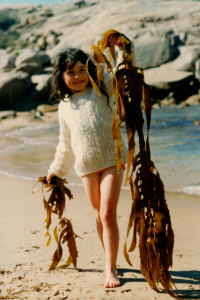 Their developing sense of movement— the kinaesthetic sense—leads to feelings of freedom. Sevens revel in their physical freedom to move; they need opportunities for large play and movement rather than a lot of time spent in screen time or small, tight movement activities, which inhibit the development of this sense. Large play also helps their sense of balance—the sense associated with finding our place in space, which is also very important to Sevens. In a broader sense, they want to know where they stand in the world. They need us to ‘prepare the space’ for them— by doing such things as telling them what they are doing the next day, for Sevens like to plan; they like to move in their own time and not be “forced” from behind by sudden orders from others.
Their developing sense of movement— the kinaesthetic sense—leads to feelings of freedom. Sevens revel in their physical freedom to move; they need opportunities for large play and movement rather than a lot of time spent in screen time or small, tight movement activities, which inhibit the development of this sense. Large play also helps their sense of balance—the sense associated with finding our place in space, which is also very important to Sevens. In a broader sense, they want to know where they stand in the world. They need us to ‘prepare the space’ for them— by doing such things as telling them what they are doing the next day, for Sevens like to plan; they like to move in their own time and not be “forced” from behind by sudden orders from others.
Sevens’ sense of life is also refining—they have an increasing sense of wellness and un-wellness. This is an ideal time for parents to encourage healthy living habits— for the children can become more aware of how respectful care of themselves—good food, sleep and so on—can make them feel, compared to overindulgence, for example.
Physically Seven is ‘healthier’ and ‘much better coordinated’ than at Six but their extra sensitivity perhaps makes them ‘more self-contained, more restrained, more cautious’. Their ‘posture is more tense and unilateral’ their physical bodies are ‘precise, compact, direct, pulled rather neatly together’ a description which has something of a Mars type in it.
Sevens’ pattern of physical energy is for great activity and then a period of rest (or collapse!) The Gesell research describes this: ’Energy at this age may be highly fluctuating.’ Sevens are ‘given to a somewhat reckless expenditure of energy until they suddenly drop with fatigue.’ ‘In outdoor play, Seven exhibits extremes’, ‘he has sudden spurts of very active behaviour.’ ’Sometimes he is tearing around, tossing a handmade paper airplane; at other times he is content to hang around, talking, swapping cards, or playing house.’ At school, ‘Seven makes a characteristically explosive transition from school room to playground at recess time.’ Here we see both the active outward thrust in activity and then a more contained recovery time. While Sevens are not particularly risk takers nor as adventurous as they will be at Eight, they are good planners and doers. All this is consistent with Mars qualities.
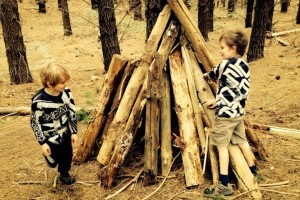
The spurt in brain growth which occurred at Six is now consolidated and allows new cognitive capacities at Seven. We see this consolidation reflected in their preference for practicing their skills, in perfecting what they have already learned. Physically and intellectually Sevens show what Gesell calls ‘a tendency towards perseveration, a tendency to go on and on with a task or situation until it is completed to satisfaction or until somebody stops him.’ For example, ‘he may ‘bounce a ball against the side of the house interminably, or read or watch TV for hours.’ Sevens also ‘are inclined to be obsessive in their play interest. Many are said to have a “mania” for or a “run” on guns, comic books, colouring.’
Gesell also suggests that: ’their tendency to persevere and perfect may work against any large measure of creativity.’ ‘Seven is not a particularly creative age.’ The free form drawing of earlier years becomes more stylised and children may, if given the opportunity, draw the same picture again and again. Teachers and schools sometimes get blamed for this more controlled creativity, though it may be merely a characteristic of development.
Sometimes, however, Sevens may just need help to stop! Gesell researchers comment: ‘Seven often demands too much of himself and, with his characteristic inability to bring things to termination, often goes on with an activity too long. Then he suddenly collapses. He needs to be helped to define stopping points.’
However Sevens also choose voluntarily to draw into themselves to work inwardly, to think and ponder. Such inwardness is strongly characteristic of Sevens, but again they may have trouble bringing it to a conclusion. Gesell describes this: ‘This is in general an age of withdrawal, of pulling in, of calming down.’ ‘But once the child of seven starts to withdraw, it is almost as though he doesn’t know where or when to stop. He goes on and on with his withdrawal until he almost seems that he might be more comfortable and contented if there were actually no other people in the world.’
This inward thrust is really about the digestion of experiences. Gesell researchers say: ‘His thinking is more intensely active than appears on the surface’. ‘Just as his hands are busy touching, exploring, feeling everything with which he comes in contact, so his mind is busy observing, reflecting. He takes in infinitely more than he gives out.’ ‘Seven is an assimilating age.’ It is ‘a time of self- absorption, during which he works his impressions over and over, oblivious to the outer world.’ Sevens are digesting their world.
As in nutrition, where we take the outer world into ourselves and build our individual body out of this, Sevens are building a sense of their own individuality out of all that comes to them through their senses. Gesell describes it this way: ‘By absorbing impressions of things seen and heard and read, and by working things over in his mind, Seven seems to be strengthening and building up a sense of self for the time when he will burst out into the world at eight.‘ Once again we find here a link with Mars qualities, for Mars is traditionally associated with the process of digestion in the human body.
Sense of self
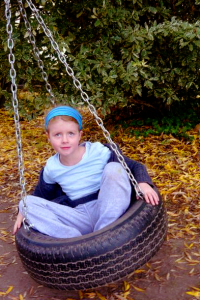 Sevens are are ‘extremely self-absorbed,‘ and, while less selfish than Sixes, are more aware of themselves. They are busy improving, strengthening and discovering themselves. They clearly want to be treated as individuals, both at home and at school.
Sevens are are ‘extremely self-absorbed,‘ and, while less selfish than Sixes, are more aware of themselves. They are busy improving, strengthening and discovering themselves. They clearly want to be treated as individuals, both at home and at school.
Their increased sensitivity and self-reflection impacts strongly on their sense of self and their behaviour. The Gesell Institute describes the age of Seven as ‘Life in a minor key’. They can seem quite melancholic in temperament and this shows in their pensiveness, their complaining-ness, their occasional brooding, heedlessness, minor strains of sadness, their sulks, mutterings and shynesses.
Poor Sevens can also be over sensitive to criticism and think people are ‘picking on them’ or do not like them. Sometimes they go too far –“everybody hates me”, “I am never going to have a good holiday.” However they also seem to enjoy their complaining! (and sound like the sad donkey, Eeyore in Winnie the Pooh by A. A. Milne – perhaps a good story for Sevens’ sense of humour!)
All this sensitivity and pondering, when turned on themselves, also makes Sevens very self-critical (“I can’t make it right!”) This self-criticism sometimes makes parents worry about Seven’s self-esteem. Certainly Seven is an age when children’s self-esteem can seem fragile, yet in reality they are really becoming more realistic about assessing their own abilities in relation to others. Positive support of what they do well can help here. It is best not to discuss their frailties in front of them for they may take it very deeply. Affirm for them that practice brings improvement, mistakes just tell us where more work needs to be done. Belief in their own ability to change things by practice helps to build optimism rather than let them be disempowered by beliefs that they just have ‘bad luck’, a melancholy tendency seen in Sevens which may need challenging. On the other hand perhaps sometimes they also need to be assured that just “good” (not “perfect”) is “good enough”.
Seven have another Mars characteristic—that of quitting when their strong will is interfered with or thwarted in some way. Sevens have the tendency to withdraw to protect themselves if play gets too complex or things go badly. Sensitive Seven is ‘easily disappointed.’ ’When things go wrong in their dealings with others, instead of staying and fighting it out as they may have done earlier, Seven-year-olds may merely withdraw from the scene, muttering “Not fair” or “a gyp”, “I’m quittin’.” ‘At home a Seven-year-old boy rushes to his room and slams the door; he may even threaten to run away from home. .. it is a desire to get away from what he may consider an intolerable situation.’ Blocked energy at Seven may also be responsible for a return of stuttering (blocked speech) in some. Sevens may need time to digest and re-gather and we need to trust in that process.
One sees a new strong sense of self in Seven in their will (like Mars). Seven is sometimes described as ‘self-willed’. Their tantrums are vanishing and their crying comes easily but shows more control and comes from inside, a wounded sensitiveness. Gesell observes:
‘Certainly one must notice and admire the child’s increasing control—control of body, control of thoughts, control of temper, control of striking out, control of voice. It is small wonder that with all the concentration this control requires, Sevens fatigue easily and must often be protected from their own demands on themselves.’ Sevens ‘conflict is now more within himself, over accomplishments, ability, performance, living up to his own standards.’
This is made the more frustrating for the child of this age because Seven is also ‘a procrastinator with a very short memory and a tendency to get distracted.’ Although Sevens are more oriented in time and space, this is still subjective. They can read a clock, but want and need to be reminded of time in a task because they are still not so good at bringing a task to a conclusion! ‘Sevens do best with rather specific instructions.’ But though they do short tasks better, they do make long-term plans.
Sevens’ deepening sense of independence helps them to cope better with fear and anger and they even enjoy a little practice of it within a “safe” situation, like in stories of trials and tribulations but ultimately, happy endings. They are still looking for safety and fairness in the world, and are developing a sense of archetypal good and bad, and the ethical rules of the world. But they still need protection from the ad hoc violence and evil to be found in the adult world, as Sevens typically also worry more. They worry about those close to them, about their relationship with others (whether parents like their siblings better!) and about themselves. A minor pain or discomfort (like hiccups) may be feared to be fatal! Worrying is another Mars trait.
New thinking
The brain growth which occurred at Six now allows the children to think in significant new ways, to really ‘cogitate’, as Sevens love to do; they now have new capacities to more consciously perceive, observe and think. Sevens’ thinking is not yet abstract thinking but it is certainly more intellectual than before. Gesell calls it ‘feeling thinking’; it is still subjective thinking, based on developing a feeling for meanings, ‘reflective fantasy’. Sevens may be interested in fairies and magic but also in causes and conditions. Their questions are best answered in rich imagery which the children can relate to personally, not abstractly, in dry adult concepts.
Sevens sometimes think so deeply and so subjectively about someone else’s experience (“John went to Bali.”) that they speak of it as if it was their own (“We went to Bali…”). Poor Seven is then accused of lying. This is reminiscent of earlier stages, when they may have appropriated other people’s property while being immersed in perhaps a fantasy of their owning it. This too was their still dreamy consciousness, rather than deliberate stealing. Nevertheless, Gesell suggests we can expect some lies from Sevens, their increasing concern over the wrongness of lying, is sometimes not powerful enough to overcome the temptation to lie. For this reason, we cannot yet appeal to the children’s honour to tell the truth. It is common to find them blaming others (usually unfounded) and alibiing (with a touch of conscientiousness- “I was going to do it!).
Sevens need time to think, order and reflect; they are good guessers, with flashes of insight, and show a new reasonableness and critical capacity. They seek intellectual rewards such as the satisfaction of finding the right answer and resent intrusions on their ruminations. Their new thinking is also reflected in their interest in conclusions and logical ends. This is a time for hypothetical questions, like “what if…?” Their questions are sometimes quite bizarre, as they sort out their thoughts about the world. “If I got tied to the back of the car and you drove off, what would happen…?” They are also interested in the paraphernalia of death—coffins, skulls and such.
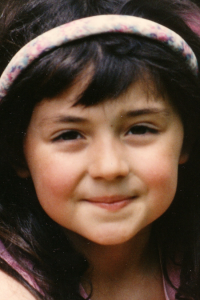 Their speech is less exuberant, more quiet than previously. Sevens use their talk for the thoughtful exploration of ideas and questions, rather than in pure uncontrolled volubility and sociability as they did at Six. ‘Seven may be much more silent and less giving in company.’ They use speech for their own growth purposes. Gesell notes he ‘likes to talk things over and work things out for himself.‘ ‘He may talk to himself, even talk to himself in front of the mirror’. They use self-talk to help their self-control. For example, one child given a task with a strict time limit said repeatedly to himself through the task, “must be quick, must be quick, must be quick, must be quick” to keep himself on task. Sevens’ tensional outlets and concentration aids may also show in their organs of speech. ‘There may be a certain amount of muttering and mumbling, loud breathing, and little throaty sounds.’ ‘Many children [of this age] whistle or make other noises as they work.’ When very tense, as mentioned earlier, they may again stutter.
Their speech is less exuberant, more quiet than previously. Sevens use their talk for the thoughtful exploration of ideas and questions, rather than in pure uncontrolled volubility and sociability as they did at Six. ‘Seven may be much more silent and less giving in company.’ They use speech for their own growth purposes. Gesell notes he ‘likes to talk things over and work things out for himself.‘ ‘He may talk to himself, even talk to himself in front of the mirror’. They use self-talk to help their self-control. For example, one child given a task with a strict time limit said repeatedly to himself through the task, “must be quick, must be quick, must be quick, must be quick” to keep himself on task. Sevens’ tensional outlets and concentration aids may also show in their organs of speech. ‘There may be a certain amount of muttering and mumbling, loud breathing, and little throaty sounds.’ ‘Many children [of this age] whistle or make other noises as they work.’ When very tense, as mentioned earlier, they may again stutter.
Home and relationships
At home, although life with their mothers is more relaxed and less intense, ‘Seven also needs her to argue with: “But, Mommy why do I have to?” They may get into a real battle of wills with their mothers, but generally in disagreements with her they are more likely to walk away with a rude remark than fight. Gesell comments: ‘Often the boy or girl merely stays on the spot and looks very very sad. In fact there is now and then something almost un-childlike in the force of feelings expressed, not just about tasks to be carried out, but about purely theoretical topics.’ Humour as a means of discipline does not work so well at Seven. The children need respect for this new inner life and their finer feelings. This force of feeling is also very characteristic of the Mars type.
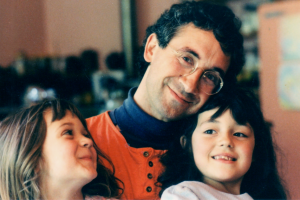
‘With siblings they are more likely to withdraw from fighting’ or ‘as likely to restrain themselves to muttering and mumbling as to hit and kick.’ Encouragement to take time to be alone after busy stimulating times (like school) is especially important for Sevens, not only to avoid conflicts with sibling, but to teach them this way of caring for themselves. They may appreciate this support for “alone time” as ‘Time alone with special pursuits is treasured.’
As we saw earlier, Sevens want to be treated as individuals. They are coming into a new relationship with others, so in relationships with adults, Sevens needs ‘a good responsive relationship’, one where they are met as a person, as an individual. This becomes clear when we look at what Sevens want from their teacher. The children yearn for individual recognition from their teachers. Gesell researchers note: ‘Children at this age are very personal. There is more of an individual relationship between each child and the teacher than earlier…each child wants a special separate relationship with her.’ They may even fall in love with her! They like the teacher ‘to come into personal touch with and talk individually to her children.’ A wise teacher of Sevens knows ‘that they need speech to make social contacts and to clarify their thoughts. She uses this individualised conversation as a technique to maintain rapport, to set up challenges and to foster self reliance.’
At home too Sevens need us to meet them fully with our individuality, our best selves preferably, as they are increasingly becoming aware of our foibles. They like to catch us out in mistakes, but they also want us to be worthy models of all that striving human beings can be. They want us to meet them as individuals, (not just as members of a family or group,) to have individual conversations about what interests them. They are naturally moving away a little from their mothers (if the mothers have been the major care givers) in making new attachments to others. They have new interest in their fathers. Today when there are so many separations from fathers in family breakups, it is important for fathers to remember how important they are in the coming years to children and try to keep a presence in their children’s lives if possible, to not give up on this. Special “sacred time” with each child in the family, without others around, can help meet this need. Individualised bed times can help make time for this on a daily basis.
So Seven is a pleasant age if we respect their feelings, their sensitivity and their privacy. They need us to be understanding of the extra sensitivity in their senses and to provide more protection for them. They need help in bringing tasks to a conclusion, frequent reminders, and flexible expectations when they need more time or are tired; they need respect for their individuality and their need for control, for open, direct and honest communication, for clear boundaries and of course good routines filled with calm, beauty, music and family warmth.
We also see in Sevens many of the qualities of Mars, both an outward acting Mars and an inward digesting Mars. We see this in that Sevens are amenable and assertive, with mood swings (sweet and good, to cross and tearful); that they feel life in every limb and can be light as well as heavy; that they like to climb, tussle and tumble.; that they have active and silly spells as well as pensive, somewhat melancholic ones; that their fluctuating physical activity moves between spurts of active behaviour and collapse. We see it in Sevens’ intensity of focus on the task, a narrowly directed energy and awareness, in their tendency to go on and on if not stopped, a focus often more on their interest or task rather than on people at times. Their characteristic digesting of experiences, their strong need for recognition as an individual, their worrying and their quitting—all these reflect Mars qualities and recognising this can help us to understand and therefore work with Sevens better.
All these prepare the way for a more adventurous, challenging year at Eight and Jupiter qualities.
View/download as pdf Seven
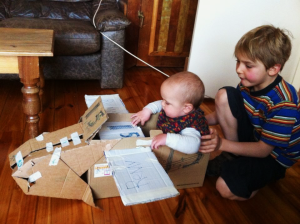
Further Reading
Bates Ames, Louise, & Chase Haber, Carol Your Seven Year Old Life in a Minor Key (A Dell Trade Paperback New York 1985 A Gesell Institute of Child Development book.
Payne, Kim John, with Lisa M. Ross Simplicity Parenting Using the Extraordinary Power of Less to Raise Calmer, Happier and More Secure kids. (Ballantine Books Trade Paperbacks, New York, 2009) Or visit their website at www.simplicityparenting.com
See also
Avoiding trouble with sevens to tens
Healthy play
Developing sexuality and the prevention of sexual abuse in young children
Strategies for healthy living in the family
Enriching life with children
Older six development profile
Eight year old development profile